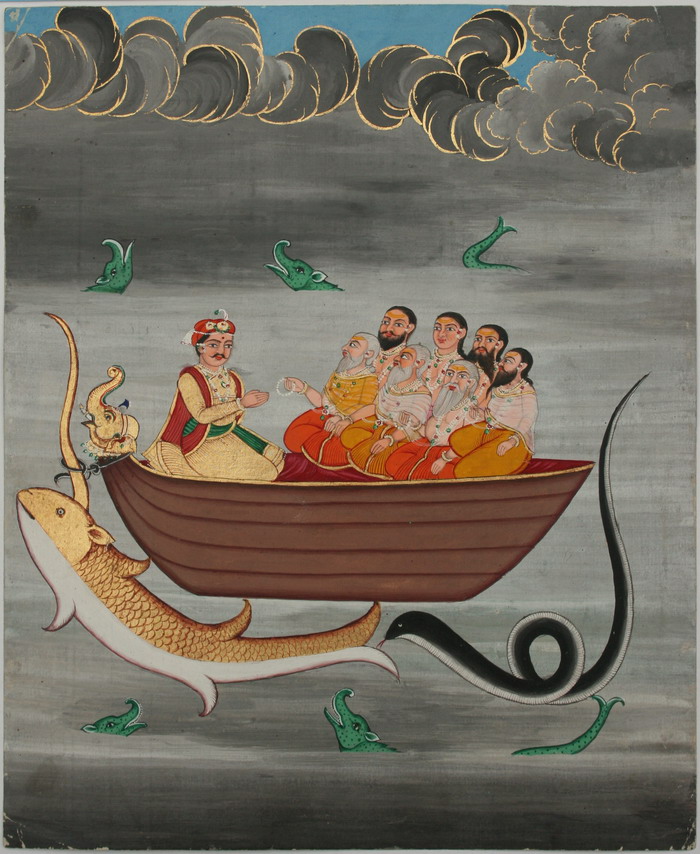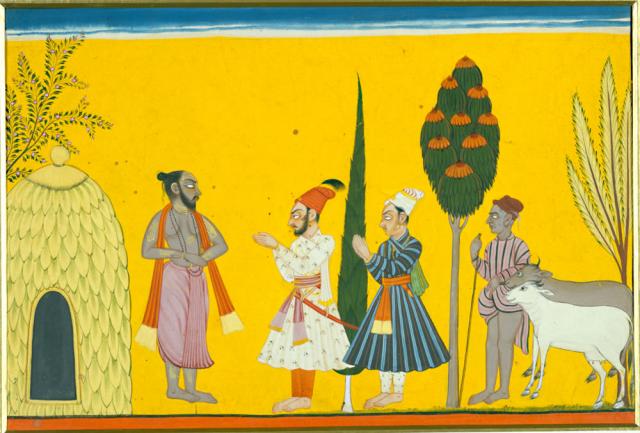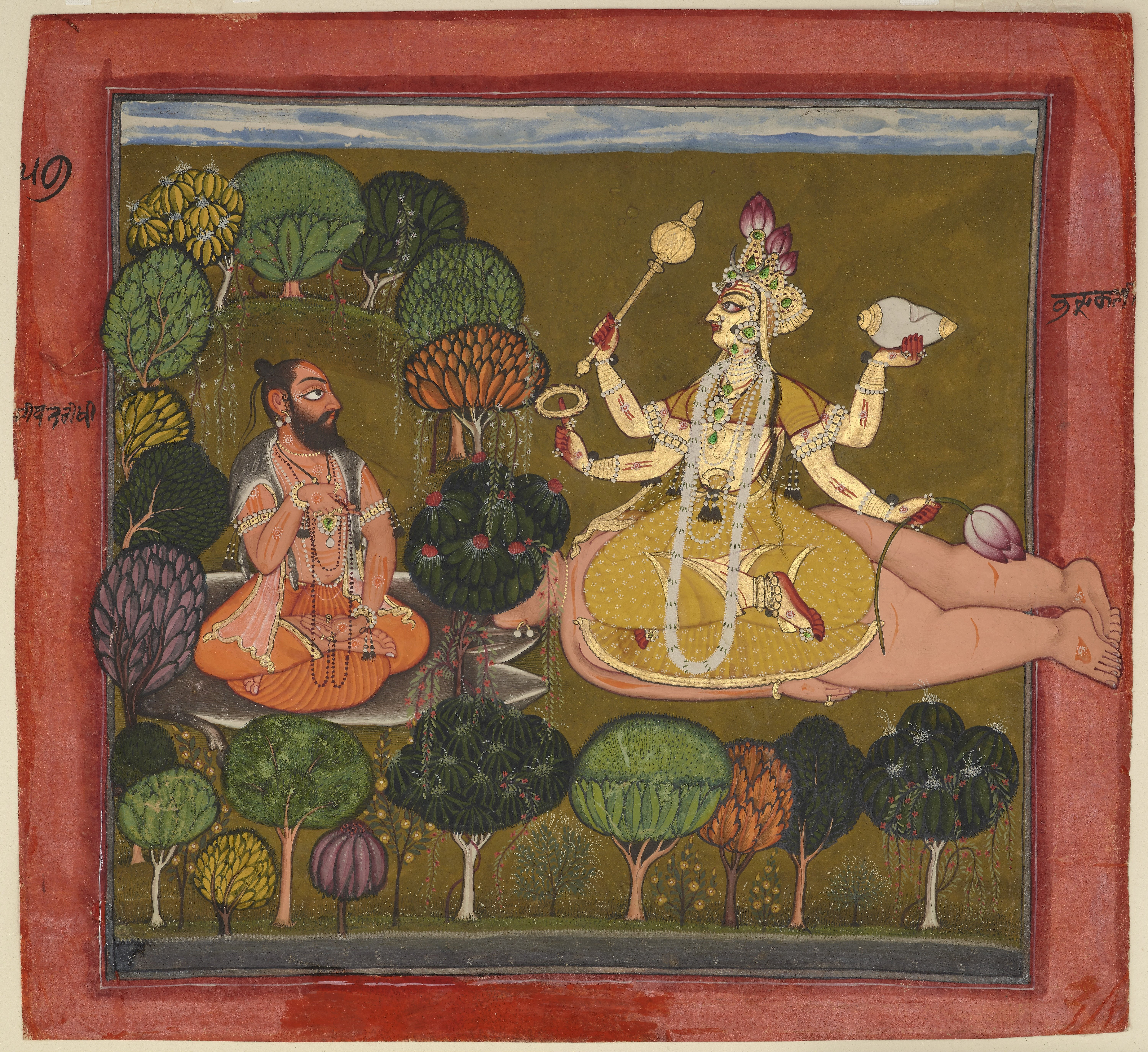|
Shakti Maharshi
In Hinduism, Shakti was a rishi (sage) and son of Vashistha and Arundhati. He was the father of Parashara, mentioned in the epic ''Mahabharata''. There is a legend found in ''Mahabharata'' about Shakti. Once King Kalmashapada, going hunting, killed many animals. Tired and being hungry and thirsty, he was proceeding through the woods. On the way, Shakti came on the same path, from the opposite direction. The King ordered him to get out of his way. The Rishi addressed the King sweetly and said "O king, this is my way". In accordance with duty and tradition, a king should always make way for Brahmins. The king persisted in acting like a Rakshasa (demon). The Rishi cursed the king thus: "O worst of the worst kings, since thou persecutest an ascetic, like a Rakshasa, thou shalt from this day, became a Rakshasa subsisting on human flesh! Henceforth, O worst of kings! thou shalt wander over the earth, affecting human form!". He was the grandfather of Vyasa, author of the Indian epic ... [...More Info...] [...Related Items...] OR: [Wikipedia] [Google] [Baidu] |
Hinduism
Hinduism () is an Hypernymy and hyponymy, umbrella term for a range of Indian religions, Indian List of religions and spiritual traditions#Indian religions, religious and spiritual traditions (Sampradaya, ''sampradaya''s) that are unified by adherence to the concept of ''dharma'', a Ṛta, cosmic order maintained by its followers through rituals and righteous living, as expounded in the Vedas. The word ''Hindu'' is an exonym, and while Hinduism has been called the oldest religion in the world, it has also been described by the modern term ''Sanātana Dharma'' () emphasizing its eternal nature. ''Vaidika Dharma'' () and ''Arya dharma'' are historical endonyms for Hinduism. Hinduism entails diverse systems of thought, marked by a range of shared Glossary of Hinduism terms, concepts that discuss God in Hinduism, theology, Hindu mythology, mythology, among other topics in Hindu texts, textual sources. Hindu texts have been classified into Śruti () and Smṛti (). The major Hin ... [...More Info...] [...Related Items...] OR: [Wikipedia] [Google] [Baidu] |
Parashara
Parashara (Sanskrit: पराशर; IAST: ) was a maharishi and the author of many ancient Hindu texts. He is accredited as the author of the first Purana, the Vishnu Purana, before his son Vyasa wrote it in its present form. He was the grandson of the sage Vasishtha and the son of the sage Shakti. There are several texts which give reference to Parashara as an author/speaker. The various texts attributed to him are given in reference to Parashara being the speaker to his student. Etymology When Parashara's father Shakti died after being devoured by the king Kalmashapada along with Vashistha's other sons, Vashistha resorted to ending his life by suicide. Hence he jumped from Mount Meru but landed on soft cotton, he entered a forest fire only to remain unharmed, then he jumped into the ocean who saved him by casting him ashore. Then he jumped in the overflowing river Vipasa, which also left him ashore. Then he jumped into the river Haimavat, which fled in several dire ... [...More Info...] [...Related Items...] OR: [Wikipedia] [Google] [Baidu] |
Vasishtha
Vasishtha (, ) is one of the oldest and revered Vedic rishis or sages, and one of the Saptarishis (seven great Rishis). Vasishtha is credited as the chief author of Mandala 7 of the ''Rigveda''. Vasishtha and his family are mentioned in Rigvedic verse 10.167.4, other Rigvedic mandalas and in many Vedic texts. His ideas have been influential and he was called the first sage of the Vedanta school of Hindu philosophy by Adi Shankara. The '' Yoga Vasishtha'', ''Vasishtha Samhita'', as well as some versions of the '' Agni Purana'' and ''Vishnu Purana'' are attributed to him. He is the subject of many stories, such as him being in possession of the divine cow Kamadhenu and Nandini her child, who could grant anything to their owners. He is famous in Hindu stories for his legendary conflicts with sage Vishvamitra. In the Ramayana, he was the family priest of the Raghu dynasty and teacher of Rama and his brothers. Etymology Vasishtha is also spelled as ' and is Sanskrit for "most ex ... [...More Info...] [...Related Items...] OR: [Wikipedia] [Google] [Baidu] |
Arundhati (Hinduism)
Arundhati () is the wife of the sage Vasishtha, one of the seven sages (Saptarshi) of Hinduism. Etymology The name in Sanskrit literally means 'washed by the rays of sun', from 'sun rays', and , 'washed'. Legend Arundhati's birth and life are mentioned in various Hindu scriptures. The birth of Arundhati is found in the Shiva Purana and Bhagavata Purana. The instruction by Brahma to Arundhati is described in the Uttara Kanda of the Ramcharitmanas. The rivalry between Vishvamitra and Vasishtha which leads to the death of her hundred sons is described in the Balakanda of Valmiki's Ramayana. The Mahabharata and several Brahmana works describe her sons, including Shakti, and grandson Parashara. Arundhati's meetings with Sita and Rama are mentioned in the Ramayana, Ramcharitmanas and Vinaya Patrika.Rambhadracharya 1994, pp. ''iii—vi''. Her role in pleading Shiva to marry Parvati is described in the sixth canto of Kumarasambhava of Kalidasa.Kale, pp. 197-199 As per the Bhag ... [...More Info...] [...Related Items...] OR: [Wikipedia] [Google] [Baidu] |
Rishi
In Indian religions, a ''rishi'' ( ) is an accomplished and enlightened person. They find mention in various Vedic texts. Rishis are believed to have composed hymns of the Vedas. The Post-Vedic tradition of Hinduism regards the rishis as "great yogis" or "sages" who after intense meditation (Tapas (Sanskrit), tapas) realized the supreme truth and eternal knowledge, which they composed into hymns.Hartmut Scharfe (2002), Handbook of Oriental Studies, BRILL Academic, , pp. 13–15. The term appears in Pali literature as Ishi; in Buddhism they can be either Buddhas, Pratyekabuddha, Paccekabuddhas, Arhat, Arahats or a Buddhist monasticism, monk of high rank. Etymology According to Indian tradition, the word may be derived from two different meanings of the root 'rsh' (). Sanskrit grammarians derive this word from the second meaning: "to go, to move". V. S. Apte gives this particular meaning and derivation, and Monier-Williams also gives the same, with some qualification. Another ... [...More Info...] [...Related Items...] OR: [Wikipedia] [Google] [Baidu] |
Vashistha
Vasishtha (, ) is one of the oldest and revered Vedic rishis or sages, and one of the Saptarishis (seven great Rishis). Vasishtha is credited as the chief author of Mandala 7 of the ''Rigveda''. Vasishtha and his family are mentioned in Rigvedic verse 10.167.4, other Rigvedic mandalas and in many Vedic texts. His ideas have been influential and he was called the first sage of the Vedanta school of Hindu philosophy by Adi Shankara. The '' Yoga Vasishtha'', ''Vasishtha Samhita'', as well as some versions of the '' Agni Purana'' and ''Vishnu Purana'' are attributed to him. He is the subject of many stories, such as him being in possession of the divine cow Kamadhenu and Nandini her child, who could grant anything to their owners. He is famous in Hindu stories for his legendary conflicts with sage Vishvamitra. In the Ramayana, he was the family priest of the Raghu dynasty and teacher of Rama and his brothers. Etymology Vasishtha is also spelled as ' and is Sanskrit for "most e ... [...More Info...] [...Related Items...] OR: [Wikipedia] [Google] [Baidu] |
Mahabharata
The ''Mahābhārata'' ( ; , , ) is one of the two major Sanskrit Indian epic poetry, epics of ancient India revered as Smriti texts in Hinduism, the other being the ''Ramayana, Rāmāyaṇa''. It narrates the events and aftermath of the Kurukshetra War, a war of succession between two groups of princely cousins, the Kauravas and the Pandava, Pāṇḍavas. It also contains Hindu philosophy, philosophical and devotional material, such as a discussion of the four "goals of life" or ''puruṣārtha'' (12.161). Among the principal works and stories in the ''Mahābhārata'' are the ''Bhagavad Gita'', the story of Damayanti, the story of Shakuntala, the story of Pururava and Urvashi, the story of Savitri and Satyavan, the story of Kacha (sage), Kacha and Devayani, the story of Rishyasringa and an Ramopakhyana, abbreviated version of the ''Rāmāyaṇa'', often considered as works in their own right. Traditionally, the authorship of the ''Mahābhārata'' is attributed to Vyasa, Vy ... [...More Info...] [...Related Items...] OR: [Wikipedia] [Google] [Baidu] |
Kalmashapada
Kalmashapada (), also known as Saudasa (), Mitrasaha (), and Amitrasaha () is a king of the Ikshvaku dynasty (the Solar dynasty) In Hindu mythology, Hindu scriptures, who was cursed to be a ''rakshasa'' (demon) by the sage Vashishtha. He is described as an ancestor of Rama, the avatar of the god Vishnu and the hero of the Hindu epic ''Ramayana''. Many texts narrate how Kalmashapada was cursed to die if he had intercourse with his queen, so he obtained a son from Vashishtha by ''niyoga'', an ancient tradition whereby a husband can nominate another man to impregnate his wife. Kalmashapada's story is narrated in various works, including the classic epic poems ''Mahabharata'' and ''Ramayana'', and the ''Purana''s.Mani, p. 377 Description The ''Mahabharata'' and the ''Purana''s agree that Kalmashapada was the son of the king Sudasa (Sudhasana); however, the ''Ramayana'' names his father was Raghu, a king whom the other texts identify as a descendant of Kalmashapada.Wilson p. 315 All ... [...More Info...] [...Related Items...] OR: [Wikipedia] [Google] [Baidu] |
Brahmin
Brahmin (; ) is a ''Varna (Hinduism), varna'' (theoretical social classes) within Hindu society. The other three varnas are the ''Kshatriya'' (rulers and warriors), ''Vaishya'' (traders, merchants, and farmers), and ''Shudra'' (labourers). The traditional occupation of Brahmins is that of priesthood (purohit, pandit, or pujari) at Hindu temples or at socio-religious ceremonies, and the performing of rite of passage rituals, such as solemnising a wedding with hymns and prayers.James Lochtefeld (2002), Brahmin, The Illustrated Encyclopedia of Hinduism, Vol. 1: A–M, Rosen Publishing, , page 125 Traditionally, Brahmins are accorded the supreme ritual status of the four social classes, and they also served as spiritual teachers (guru or acharya). In practice, Indian texts suggest that some Brahmins historically also became agriculturalists, warriors, traders, and had also held other occupations in the Indian subcontinent.GS Ghurye (1969), Caste and Race in India, Popular Prakasha ... [...More Info...] [...Related Items...] OR: [Wikipedia] [Google] [Baidu] |
Vyasa
Vyasa (; , ) or Veda Vyasa (, ), also known as Krishna Dvaipayana Veda Vyasa (, ''Vedavyāsa''), is a ''rishi'' (sage) with a prominent role in most Hindu traditions. He is traditionally regarded as the author of the epic Mahabharata, Mahābhārata, where he also plays a prominent role as a character. He is also regarded by the Hindu traditions to be the compiler of the mantras of the Vedas into four texts, as well as the author of the eighteen Puranas, Purāṇas and the Brahma Sutras. Vyasa is regarded by many Hindus as a Avatar, partial incarnation (, ) of Vishnu. He is one of the immortals called the Chiranjivis, held by adherents to still be alive in the current age known as the Kali Yuga. Name "Vyasa" (Vyāsa) means "compiler" or "arranger and also "separation" or "division."Sanskrit Dictionary for Spoken Sanskrit''Vyasa''/ref> Other meanings include "split," "differentiate," or "describe." It is also a title, given to "a holy sage or a pious learned man," and is app ... [...More Info...] [...Related Items...] OR: [Wikipedia] [Google] [Baidu] |
Epic Poetry
In poetry, an epic is a lengthy narrative poem typically about the extraordinary deeds of extraordinary characters who, in dealings with gods or other superhuman forces, gave shape to the mortal universe for their descendants. With regard to oral tradition, epic poems consist of formal speech and are usually learnt word for word, and are contrasted with narratives that consist of everyday speech where the performer has the license to recontextualize the story to a particular audience, often to a younger generation. Influential epics that have shaped Western literature and culture include Homer's ''Iliad'' and '' Odyssey''; Virgil's '' Aeneid''; and the anonymous '' Beowulf'' and '' Epic of Gilgamesh''. The genre has inspired the adjective '' epic'' as well as derivative works in other mediums (such as epic films) that evoke or emulate the characteristics of epics. Etymology The English word ''epic'' comes from Latin , which itself comes from the Ancient Greek adject ... [...More Info...] [...Related Items...] OR: [Wikipedia] [Google] [Baidu] |







